Emergency Care
True orthodontic emergencies are rare, but when they occur we are available to you. As a general rule, you should call our office when you experience severe pain or have a painful appliance problem you can't take care of yourself. We'll be able to schedule an appointment to resolve the problem.
You might be surprised to learn that you may be able to solve many problems yourself temporarily until you can get to our office. If there is a loose piece that you can remove, put it in a plastic bag or envelope and bring it with you to your next appointment. If your braces are poking you, put soft wax on the piece that's sticking out. If the wire has slid to one side, you can pull it back to the other side with needle-nosed pliers, replacing it in the tube on the back tooth.
After alleviating your discomfort, it is very important that you still call our office as soon as possible to schedule a time to repair the problem. Allowing your appliance to remain damaged for an extended period of time may result in disruptions to your treatment plan.
General soreness
When you get your braces on, you may feel general soreness in your mouth, and teeth may be tender to biting pressures for three to five days. Stick to a soft diet until your teeth do not hurt to chew. If the tenderness is severe, take Acetaminophen (Tylenol) or whatever you normally take for headache or similar pain.
The lips, cheeks, and tongue may become irritated for one to two weeks as they learn a new posture and become accustomed to the surface of the braces. You can put wax on the braces to lessen this. We'll show you how!
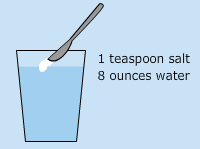
Irritations and Sores in the Mouth
Until your mouth gets used to your braces, they can cause you to have irritations where the metal rubs up against the lips, cheeks, or gums. Sores may also develop. Most often times, these sores heal within a week or two as the tissue inside your mouth toughens and becomes used to the braces. In the meantime, you can also use the following recommendations to lessen the tenderness.
Dental Wax: The simplest way to stop your mouth from getting torn up is to create a barrier between your brackets and the inside of your mouth. Just break off a little bit of wax and apply right over the bracket or wire that is causing the irritation. Use as much as you need, we can always give you more.
Warm Salt Water Rinse: Dissolve one teaspoonful of salt in eight ounces of warm water. Rinse your mouth several times per day with this warm solution. The salt water solution soothes your mouth sores and helps them heal.
Topical gels: Direct applications of Orajel or a similar preparation designed for teething pain, cold sore relief, or canker sores can help soothe sores.
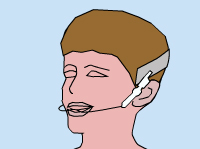
Headgear
Sometimes discomfort is caused by not wearing the headgear as instructed by your orthodontist. Please refer to the instructions provided by your orthodontist. If the facebow (metal piece) is bent, please call our office for assistance. The headgear should hurt less the more it's worn, so be sure you get in the prescribed number of hours.
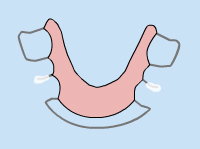
Loose appliance
If your appliance is poking you, place wax on the offending part.
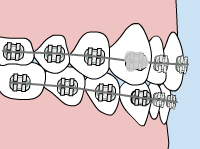
Loose bracket
If your bracket or band is still attached to the wire, you should leave it in place and put wax on it if needed for comfort. If the bracket or band can be removed easily, place it in an envelope and save it to bring to your next appointment.
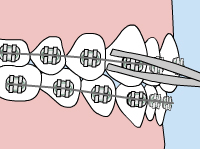
Loose wire
Using a pair of tweezers or needle-nosed pliers, try to put your wire back into place. It is okay to use a piece of floss to tie the wire into place: tie the floss around the bracket in place of the missing colored o-ring. If you cannot put the wire into a comfortable position, and covering the end with wax doesn't help, as a last resort use a small fingernail clipper to clip the wire behind the last tooth to which it is securely fastened. If the end of the wire is still sharp place wax on it.
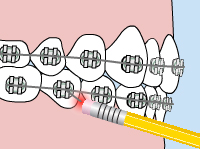
Poking wire
Using a pencil eraser, push the poking wire down or place wax on it so that it is no longer poking.



